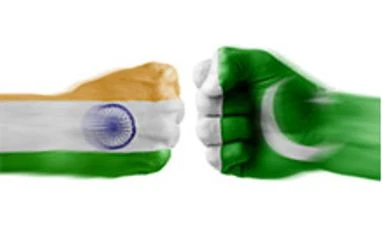The World Cup may start Feb 14 but for the Indian sub-continent the tournament will well and truly begin a day after when defending champions India face traditional rivals Pakistan in a Group B match at the Adelaide Oval.
The two neighbours have a rich history of fierce battles on the cricket ground and each encounter sees partisan feelings rise to a feverish pitch.
While Pakistan enjoy a considerable advantage in the overall One-Day International (ODI) head-to-head count, claiming 72 of the 126 battles, India possess a 5-0 scoreline in the World Cup matches.
The build-up to the tournament has been, expectedly, overshadowed by the expectations of the supporters of the two nations regarding the outcome of the match. For most of them, a victory against the traditional rivals is as good as winning the Cup.
Justifying all the hype, the tickets for the eagerly-awaited contest were sold out in 20 minutes for the 50,000-capacity stadium, with the South Australian government expecting around 20,000 Indian travellers for the marquee clash.
While experts, comprising former players and famous voices of the game, all busy airing their opinion about the high-octane clash, expect it to be the most watched match in the sport's history, a quick glance at the past World Cup battles reveals some interesting aspects of the coloured rivalry.
More From This Section
1992 - India won by 43 runs
It was the first time that the two nations met at a World Cup match. India, buoyed by a young and emerging Sachin Tendulkar's fine unbeaten knock of 54 runs, posted 216 and bowled out Pakistan for 173 to register a convincing victory.
1996 - India won by 39 runs
This quarter-final match, played at a packed M. Chinnaswamy Stadium in Bangalore, was keenly-contested. While opener Navjot Singh Sidhu scored an authoritative 93 to set India a strong platform, middle-order batsman Ajay Jadeja put the finishing touches to the innings, blasting a 25-ball 45 -- being particularly severe on pacer Waqar Younis -- to enable India post a commanding 287 for eight on the board.
Pakistan's response was aggressive and their openers Saeed Anwar and Aamir Sohail threatened to take the match away. But a middle-order collapse, triggered by tight slow bowling by spinners Anil Kumble and Venkatpathy Raju, guided India to victory, despite the best efforts of veteran batsmen Javed Miandad and Salim Malik.
1999 - India won by 47 runs
India batted first for the third consecutive Cup game and posted a respectable total of 227 for six wickets. Their total was driven by useful knocks from Tendulkar (45), Rahul Dravid (61) and skipper Mohammed Azharuddin (59). Pakistan's batting once again let them down, getting dismissed for 180 in 45.3 overs. They crumbled to the pace duo of Venkatesh Prasad (5/27) and Javagal Srinath (3/37).
2003 - India won by 6 wickets
Even batting first couldn't reverse the tide for Pakistan despite their posting a strong total of 273. Opener Anwar, always a threat to India, hit a fine century (101) but he was eclipsed by graceful hitting from Tendulkar (98) who, together with fellow opener Virender Sehwag (21), launched a stunning attack on the famed pace trio of Wasim Akram, Shoaib Akhtar and Waqar Younis.
Dravid (44 not out) and Yuvraj Singh (unbeaten 50) also played crucial knocks to seal victory with 26 balls to spare.
2011 - India won by 29 runs
Tendulkar (85) again rose to the occasion in a crunch semifinal and helped India to a fighting total of 260 for nine. The home team was well placed to post a superior total but was restricted by left-arm pacer Wahab Riaz (5/46).
Pakistan's response was typical, a strong start followed by a middle-order failure.
The onus fell on the reliable Misbah-ul-Haq (56) to pull Pakistan through but he ran out of partners and ultimately was the last person to be dismissed.
Indian bowlers collectively put up a superb performance with all five frontliners picking up two wickets each on their way to title glory.
)